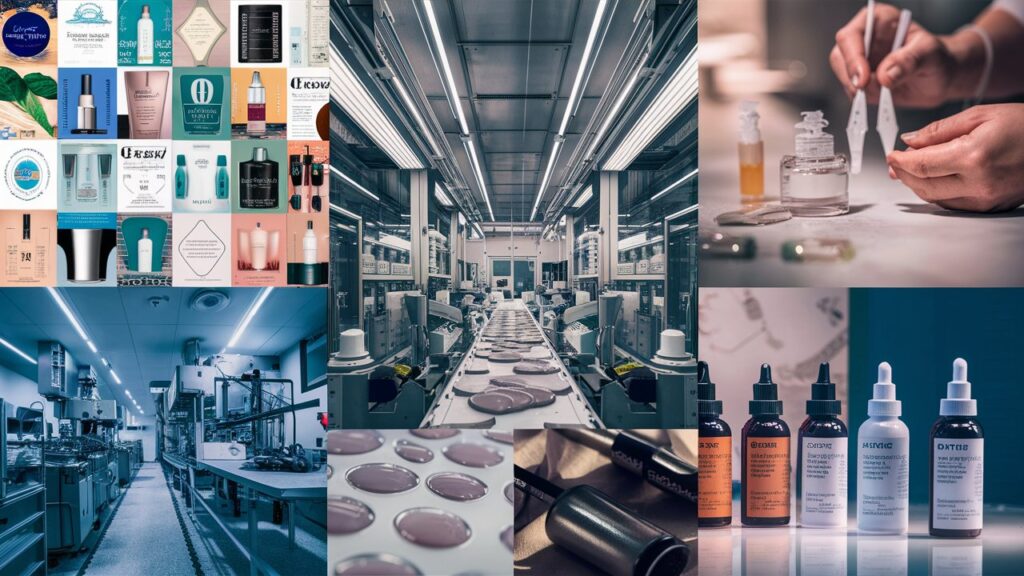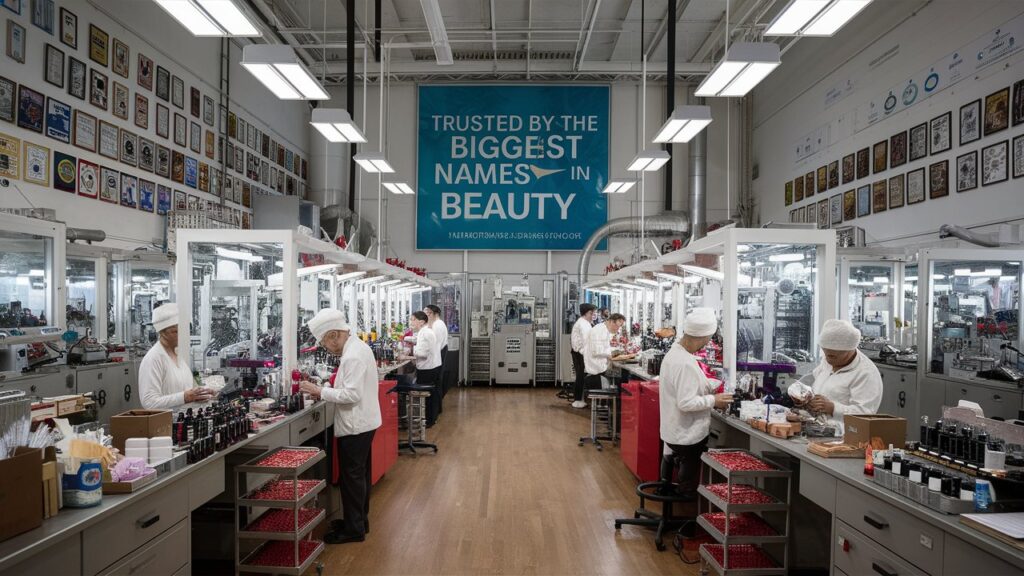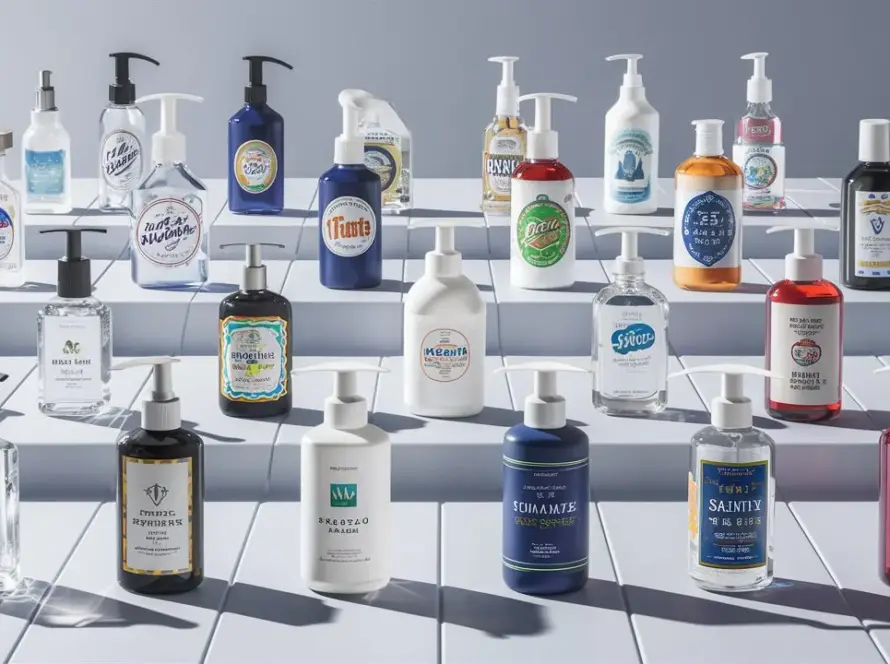In the competitive cosmetics sector, choosing the right manufacturer is crucial to brand success. It can be difficult to identify the best third-party cosmetic manufacturer due to their diverse capabilities and knowledge. The beauty sector is booming, and people want new, innovative products to look better.
If you’re an entrepreneur trying to build your personal beauty brand, collaborating with a third-party manufacturer can be the best decision. This lets you focus on branding, marketing, and business growth while experts handle production. Partnering with a reliable third-party cosmetic manufacturer can help your cosmetic business succeed. As listed below, choosing a cosmetics company involves careful consideration of multiple parameters due to severe competition.

Define what you need from Third-Party Cosmetic Manufacturer
Before searching for a third-party cosmetic producer, you must define your needs. Consider product kind, formulation complexity, production volume, regulatory compliance, and timetable. Knowing your needs can help you limit your options and choose a manufacturer who can meet them.
Analyse Manufacturing Capabilities:
Assess a partner’s production facilities, machines, and technology. Find manufacturers with modern facilities, machinery, and automation. Ask about their experience making beauty items like yours and their ability to alter manufacturing to meet your needs.
Experience and Expertise
Finding a third-party manufacturer with vast experience and expertise in making high-quality items is vital. For instance, a skincare manufacturer may not suit your makeup line. Find a manufacturer known for their high-quality beauty products and significant experience.
Production Capacity and Turnaround Time
Consider the manufacturer’s production capacity and turnaround times. Can they create the number of products you need efficiently and with the resources they need? Make sure they can satisfy your delivery deadline and quality criteria.
Product Quality and Safety
Quality and safety are crucial in the cosmetics sector. Find a precision- and regulation-focused manufacturer. Use high-quality ingredients and packaging. The manufactured items, ingredients, and packaging will be extensively inspected for quality.
Quality control records should be kept for future reference. They can assist you in preparing product safety and effectiveness documentation. To provide high-quality products, manufacturers must be transparent about their sourcing and manufacturing processes.
Quality and Compliance Standards:
The cosmetics industry requires quality and compliance. Make sure that the third-party manufacturer satisfies GMP and ISO standards and maintains tight quality control processes. Send batch records, testing protocols, and certificates of analysis to demonstrate your quality assurance processes.
Customisation and Flexibility
Beauty entrepreneurs may have unique product ideas and needs that demand adaptation. Find a manufacturer with flexible manufacturing techniques so you may make custom products. Being open to collaboration and communication throughout the production process can help make any necessary improvements. Instead of accepting the manufacturer’s offer, examine what fits your market strategy and audience.
Reputation and Track Record:
Check out potential manufacturing partners’ reputations and track records by asking for references, reading customer reviews, and, if possible, visiting their facilities. Find manufacturers who consistently provide high-quality products on time. A trustworthy manufacturer will prioritise transparency, communication, and responsibility throughout production.
Third-Party Cosmetic Manufacturer,A Team-Based Approach:
Choose a third-party manufacturer who supports cooperation and partnership. Good communication and teamwork are needed to agree on product specs, schedules, and expectations. Find manufacturers who will guide, advise, and support you from concept to product launch.

Sustainability and Ethics
Consumers value sustainable and ethical products in today’s environmentally sensitive market. Assess the manufacturer’s sustainability commitment:
- Ask about the manufacturer’s waste reduction, sustainable packaging, and environmental efforts.
- Make sure the manufacturer uses fair labour and responsible sourcing.
- Look for cruelty-free or organic certifications.
Cost Considerations:
While cost shouldn’t be the only factor, pricing is vital when choosing a third-party cosmetic manufacturer. It is crucial to select a manufacturer that provides competitive pricing while maintaining high standards of quality and reliability.
Take into account the overall expenses, which may involve extra fees or charges. Compare manufacturer quotes, setup fees, production expenses, and minimum order quantities. When choosing a manufacturer, weigh pricing, reputation, quality, and service.
Intellectual Property and Confidentiality
Partnering with a third-party cosmetic manufacturer requires protecting your brand’s intellectual property and maintaining confidentiality. Consider these factors:
- Make sure the manufacturer will sign an NDA to protect your proprietary information and formulae.
- Your contract should specify your ownership of intellectual property, such as product formulations and branding materials.
- Consider data security procedures to safeguard brand and product data.
Testing and Samples:
Before buying from a third-party cosmetic manufacturer, check their quality. Look for a company with product samples and testing data to verify ingredient and formulation quality. To assure product consistency and efficacy, understand their ingredient purity, potency, and stability testing processes.
Logistics and Location:
The manufacturer’s location affects transportation costs, import/export regulations, and logistics efficiency. Consider these logistical factors.
- Consider the manufacturer’s proximity to your target markets. This impacts shipping times and prices.
- Make sure the Third-Party Cosmetic Manufacturer has experience exporting cosmetics from India and knows international shipping restrictions.
- Learn your target market’s requirements to ensure a smooth distribution procedure.
References and Reputation
One manufacturer’s reputation can speak volumes about its reliability and quality. Ask for client references and read reviews. Search for online reviews and testimonials from manufacturer-partnered products. Consider both positive and negative input. Request manufacturer references and ask these brands about their experiences. Assess the manufacturer’s on-time delivery, product quality, and customer satisfaction record.
Communication and Responsiveness
Effective communication is crucial in every company partnership, especially when choosing a third-party manufacturer. Find a Third-Party Cosmetic Manufacturer who answers questions fast, updates production and delivery, and provides assistance and guidance. Clear communication and timely responses can prevent misunderstandings and expedite product delivery.
Conclusion
Choosing the best third-party cosmetic manufacturer involves considering many aspects. These include examining their production capabilities, quality standards, reputation, collaborative style, pricing, location, and logistics. These cover some of the essential considerations but also depend on the specific scope and requirements of your cosmetics brand.
You may find a manufacturing partner who shares your brand’s vision, beliefs, and ambitions by researching, considering your needs, and analysing possible partners. This will enable a successful relationship and product launch. After doing your research and finding a manufacturer you trust and feel comfortable dealing with, you’ll be ready to launch a beauty product line. Give your brand to a manufacturer who understands your feelings and treats it like his.

FAQs
What should I look for in a third-party cosmetic manufacturer?
The key factors you must consider are its manufacturing capabilities, quality control processes, regulatory compliance, minimum order quantities, lead times, pricing, and location. Before choosing any manufacturing company, you must research their experience level, specialities, and reputation in the industry.
How do I ensure they follow good manufacturing practices?
You should always look for manufacturers that are GMP (Good Manufacturing Practices) certified and follow strict quality control protocols. Also, you can ask them bout their testing procedures, documentation practices, cleaning validation, and process controls.
What regulations must third-party manufacturers comply with?
In the cosmetics industry, Third-Party Cosmetic Manufacturer must follow FDA regulations around ingredients, labelling, claims, and facility registration, even if making products for private labels. Make sure they have a thorough regulatory understanding.
How should I verify their manufacturing capabilities?
You should analyse whether their equipment, technology, scale of operations and staffing expertise align with your product needs. Don’t forget to ask about their manufacturing capacity, materials sourcing, formulation development skills, and packaging options.
What about proprietary formulas and intellectual property?
Remember to have a word on confidentiality and non-disclosure agreements to protect your trade secrets. Also, inquire about security protocols to safeguard your formulas and prevent unauthorised replication.
FOR MORE SUCH BLOGS – CLICK HERE
FOLLOW US ON INSTAGRAM – royal_industries.ltd





